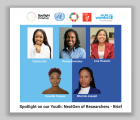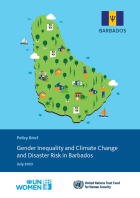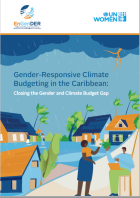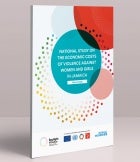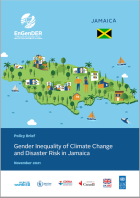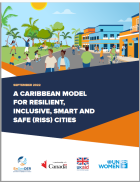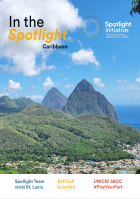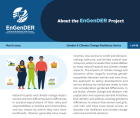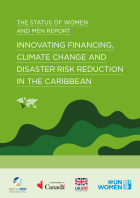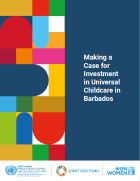Date:
This Knowledge Product was funded by the Joint SDG Fund Programme, Integrated Population Data and Policy Solutions to Accelerate SDGs Achievement in Barbados and Montserrat, and aims to facilitate gender analysis for evidence-based policy and programme development in Barbados and Montserrat, with a focus on SDG 3, to ensure healthy lives and promote well-being for all at all ages, and SDG 5, to achieve gender equality and empower all women and girls.
Date:
In 2024, Barbados, in adherence to its commitment to meet Sustainable Development Goals (SDGs) by 2030, fostered a partnership between the Barbados Statistical Service and the UN Women MCO – Caribbean to collect data to measure SDG indicator 5.4.1, which is the proportion of time spent in a day on unpaid domestic and care work (UDCW), by sex, age and location.
Date:
Violence Against Women and Girls (VAWG) has economic costs for individuals (e.g., victims and their children), families, communities and society at-large. Several countries have estimated the costs of VAWG, in an effort to understand the economic impacts of VAWG on the national economy and to determine investments needed to lessen, if not eliminate VAWG.
Date:
This resource provides policymakers in the trade sector with practical steps on how to mainstream gender equality into trade sector policies, programmes and initiatives
Date:
These guidelines are intended to help improve the quality of administrative data on VAWG, and the ethical practices which attend the collection of this data. Accordingly, the primary audience is those entities which produce administrative data on VAWG at the national and sub-national levels.
Date:
The Caribbean Self-Care toolkit is an evolving collection of effective tools and links to other resources, to help individuals and mental health and psycho-social providers improve wellbeing in all the domains of wellness.
Date:
UN Women MCO in its role as the lead agency for Data and Research under the EU-UN Spotlight Initiative Programme facilitated the opportunity for four young Caribbean women to develop and strengthen their skills in data collection and analysis but more importantly, to contribute to an initiative which empowers young women and girls, works towards achieving gender equality, and addresses VAWG in Caribbean societies.
Date:
The National Strategic Action Plan on Gender-Based Violence and Sexual Violence 2023 – 2027 of Trinidad and Tobago is an evidence-based strategy that seeks to eliminate gender-based violence and sexual violence within the national community while enhancing the rights and safety of all women, girls, men and boys
Date:
To gain greater clarity on the dynamics of these risks and the potential impacts of disasters and the impact of climate change on human security, UN Women undertook a gender and age inequalities analysis in the context of Barbados. The study was commissioned under the United Nations (UN) Joint Programme, entitled “Building Effective Resilience for Human Security in the Caribbean Countries: The Imperative of Gender Equality and Women Empowerment in a Strengthened Agriculture (and related Agri/Fisheries Small Business) Sector,” is funded by the UN Trust Fund for Human Security (UNTFHS).
Date:
Gender-Responsive Climate Budgeting in the Caribbean for Enabling Gender-Responsive Disaster Recovery, Climate and Environmental Resilience in the Caribbean (EnGenDER) countries (the ‘guidance document’) aims to help stakeholders close a significant gender and climate budget gap at the national and sectoral level
Date:
Violence Against Women and Girls (VAWG) has economic costs for individuals (e.g., victims and their children), families, communities and society at-large. Several countries have estimated the costs of VAWG, in an effort to understand the economic impacts of VAWG on the national economy and to determine investments needed to lessen, if not eliminate VAWG.
Date:
In this latest edition of In the Spotlight Caribbean, read about the new Caribbean CSO alliance to address gender-based violence, UN Women and ReThink’s work for building a regional pool of CARICOM data experts to lead on collecting statistics on Violence against Women and Girls (VAWG) in the Caribbean and UNDP and the University of the West Indies, Mona collaboration for regional gender bureaus and more...
Date:
EnGenDER Gender Inequality Climate Change & Disaster Risk Resilience Brief - JAMAICA
Date:
This Caribbean Resilient, Inclusive, Smart and Safe (RISS) Cities Model for the planning and development of public space in urban and other settlements addresses the integrated nature of urban planning
Date:
The EU-UN Spotlight Trinidad and Tobago Programme is being implemented with special focus in Tunapuna/Piarco, Mayaro/Rio Claro and Tobago. The TT Spotlight Newsletter Issue 5 focuses on several of recent issues and events including a donation to the TTPS's VWSU, the role of culture and art in addressing GBV, and a campaign to support the Children's Authority.
Date:
This issue of the Spotlight Regional Programme Newsletter showcases the work that has steadily progressed for the first six months of this year.
Date:
This Gender and Climate Change Resilience Series is an analysis of the gender inequality of climate change and disaster risks in nine Caribbean countries: Antigua and Barbuda, Belize, Dominica, Grenada, Guyana, Jamaica, Saint Lucia, Saint Vincent and the Grenadines, and Suriname – that are the beneficiaries of the Enabling Gender-Responsive Disaster Recovery, Climate and Environmental Resilience in the Caribbean (EnGenDER) Project
Date:
This Status of Women and Men Report focuses on coping mechanisms adopted by men and women in response to large- and small-scale, sudden and slow-onset, frequent and infrequent, and natural or man-made hazards. The report profiles the Caribbean to provide insights into areas of vulnerability, climate change and disaster risk reduction methods adopted in the region.
Date:
In Saint Lucia, meaningful and effective public intervention in the childcare market is necessary to create a system that works for all parents/guardians and children, and that benefits the overall economy. In fact, an increase in access to quality early childhood services can have several social and economic benefits, and help to bring Saint Lucia closer to meeting various Sustainable Development Goals (SDGs) in the 2030 Agenda for Sustainable Development.
Date:
This report makes an argument for public investment in universal childcare in Barbados; specifically, it explores the potential effects and benefits of investing in universal childcare. Effective provision of universal childcare is defined as one that eliminates barriers to equitable access and participation.







